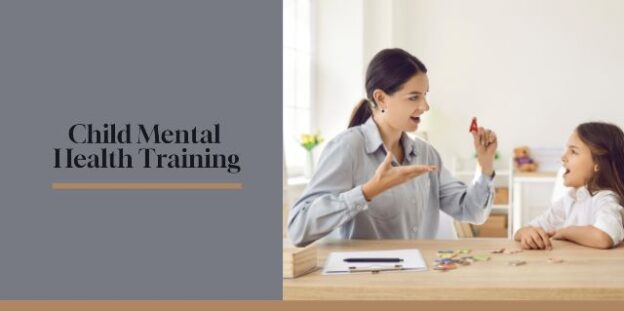The Child Mental Health Training online course is designed to provide comprehensive training on understanding and supporting the mental health of children and adolescents. This course aims to equip participants with the knowledge and skills necessary to recognize common mental health challenges, promote positive mental well-being, and provide appropriate support to children in need.
What you’ll learn:
Module 1: Introduction to Child Mental Health
– Understanding the importance of child mental health
– Overview of common mental health challenges in children
– Factors influencing mental well-being in children
Module 2: Recognizing Signs and Symptoms
– Identifying signs of mental health issues in children
– Understanding age-specific manifestations of mental health challenges
– Differentiating between normal developmental behaviors and mental health concerns
Module 3: Common Childhood Mental Health Disorders
– Overview of common mental health disorders in children
– Symptoms, causes, and risk factors of disorders such as anxiety, depression, ADHD, and autism spectrum disorders
– Exploring co-occurring disorders and comorbidity
Module 4: Promoting Positive Mental Well-being
– Strategies for promoting positive mental health in children
– Nurturing resilience and protective factors
– Developing healthy coping mechanisms and emotional regulation skills
Module 5: Communication and Active Listening
– Effective communication techniques with children and adolescents
– Active listening skills and empathetic responses
– Creating a safe and supportive environment for disclosure
Module 6: Supporting Children in Distress
– Providing immediate support and crisis intervention
– Strategies for de-escalating difficult situations
– Recognizing and responding to self-harm and suicidal ideation
Module 7: Collaboration with Parents and Guardians
– Building partnerships with parents and guardians
– Communicating concerns and sharing information
– Collaborating on interventions and support strategies
Module 8: Referral and Resources
– Understanding the referral process to mental health professionals
– Familiarizing with local and national resources for child mental health support
– Providing appropriate information and guidance to families seeking help
Module 9: Self-Care for Child Mental Health Professionals
– Importance of self-care in child mental health work
– Developing self-care strategies to prevent burnout
– Recognizing the impact of vicarious trauma and seeking support
Career Path:
Completing the Child Mental Health Training course can open up various career opportunities where knowledge of child mental health is valued. Here are some potential career paths:
1. Child Mental Health Counselor/Therapist: Work as a counsellor or therapist specializing in child mental health. Provide individual or group therapy to children and adolescents, helping them address mental health challenges and develop coping skills.
2. School Counselor: Work within educational settings as a school counsellor, supporting the mental well-being of students. Provide guidance, counselling, and referral services to address emotional and behavioural concerns.
3. Child Psychologist/Psychiatrist: Pursue a career in child psychology or psychiatry, conducting assessments, diagnosing mental health disorders, and developing treatment plans for children and adolescents.
4. Child Welfare Advocate: Advocate for the mental health needs of children within the child welfare system. Work in roles such as case manager, social worker, or advocate to ensure children’s mental health needs are addressed in their care.
5. Mental Health Educator/Trainer: Use your expertise in child mental health to educate and train professionals, parents, and caregivers. Conduct workshops, develop educational materials, and provide guidance on promoting positive mental health in children.
6. Policy Advisor/Researcher: Contribute to policy development and research initiatives focused on child mental health. Work with government agencies, non-profit organizations, or research institutions to shape policies and interventions for children’s mental well-being.

